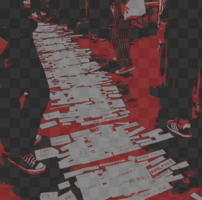Entre a ferida aberta e a sutura: a posicionalidade dos estudantes frente às opressões no processo formativo em Design na ESDI/UERJ
A pesquisa procura investigar, junto aos estudantes da Escola Superior de Desenho Industrial da Universidade do Estado do Rio de Janeiro (ESDI/UERJ), como as opressões estão inseridas no processo formativo em Design. Busca-se também reconhecer e/ou criar espaços de diálogo para o enfrentamento das opressões identificadas, tais como raça, classe e sexualidade. A investigação trata das interações sociais dentro e fora da sala de aula, compreendendo as práticas pedagógicas adotadas a partir das experiências e reflexões dos discentes de Design da ESDI/UERJ nos anos de 2022 e 2023. A pesquisa se vale de uma perspectiva posicionada e interseccional, visando contribuir para um reconhecimento crítico do processo formativo em Design, mesmo que a partir de uma perspectiva localizada. Na primeira etapa, foram realizadas duas dinâmicas em disciplinas distintas, culminando na análise do impacto da posicionalidade dos estudantes na elaboração de soluções de projeto e conteúdo para as aulas. Na segunda etapa, foi realizada uma oficina intitulada Tecido Social, que buscou compreender como os estudantes se sentem afetados pelas opressões que violam suas experiências diante do processo formativo. Posteriormente, foi realizada uma conversa online com os mesmos estudantes-participantes da oficina para aprofundar e discutir as impressões deixadas por ela, investigando os interesses e mobilizações realizadas por eles ao apresentarem seus modos de validar suas presenças nesse espaço. Como resultados, conclui-se que a aprendizagem ocorre não apenas no currículo, mas também nas relações interpessoais. Parte das opressões manifesta-se nas interações sociais cotidianas, enquanto outra parte ocorre quando os conteúdos do curso reforçam valores hegemônicos que oprimem certos grupos sociais. Apesar das experiências negativas, os estudantes reconhecem na universidade espaços e relações nos quais podem validar suas perspectivas, afirmar-se como sujeitos e desenvolver-se profissionalmente.
The research seeks to investigate, with the students of the School of Industrial Design of the State University of Rio de Janeiro (ESDI/UERJ), how oppressions are inserted into the design training process. It also seeks to identify and/or create spaces for dialogue to confront the oppressions identified, such as race, class and sexuality. The research deals with social interactions inside and outside the classroom, understanding the pedagogical practices adopted from the experiences and reflections of ESDI/UERJ Design students in the years 2022 and 2023. The research uses a positioned and intersectional perspective, aiming to contribute to a critical recognition of the design education process, also from a localized perspective. In the first stage, two dynamics were carried out in different disciplines, culminating in an analysis of the impact of students' positionality on the development of design solutions and content for classes. In the second stage, a workshop entitled "Social Fabric" was held to understand how students feel affected by the oppressions that violate their experience of the educational process. Subsequently, an online conversation was held with the same students who had participated in the workshop, in order to deepen and discuss the impressions left by the workshop, exploring the interests and mobilizations that they have made in presenting their ways of validating their presence in this space. The results show that learning takes place not only in the curriculum, but also in interpersonal relationships. Some of the oppression manifests itself in everyday social interactions, while some occurs when course content reinforces hegemonic values that oppress certain social groups. Despite negative experiences, students identify spaces and relationships at the university where they can validate their perspectives, assert themselves as subjects, and develop professionally.
